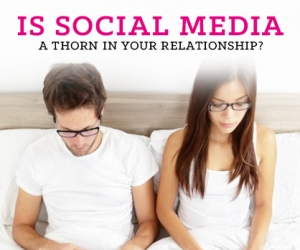Break Free From Your Addiction To Social Media
Here's how to reclaim your time
Ever go onto Facebook for a quick peek and find yourself a half hour later, still checking out the newsfeed and clicking occasional “likes” to various postings? It's easy to waste time on social media without any solid benefit for the time spent.
If you find yourself online when you're supposed to be working or studying, then you might need to take a breather from Instagram, Facebook, Pinterest and Twitter.
Here are tips on how to reclaim your precious time and break your addiction to social media.


Determining if you're addicted
There's a distinct difference between a healthy use of social media and an addiction. If you find yourself spending hours each day online, and you're unable to pick up your mobile device without checking to see if there's anything new on Facebook or Instagram, then you might need to take a step back and consider your behavior.
Tina Tessina, Ph.D., psychotherapist and author of It Ends With You: Grow Up and Out of Dysfunction, said, “Addiction and compulsion are defined by how much they interfere with your life. If you can't control your use, it's important to get treatment for the addiction, even if it's social media. When the level of your internet use means you neglect or have problems with your family, your social life, your health, you are likely to be addicted.”
“If your family constantly complains that you're on the computer too much, or you don't get out for social events or to exercise, your computer use is excessive and probably addictive,” Tessina said.
The main difference between healthy internet use and an addiction is that you can control your use if you're not addicted, she said.
“If a computer, smartphone or other outlet is unavailable, it is disappointing but not devastating. In addiction, the addict feels desperate to have his or her internet outlet, no matter the cost,” she said.
Ask yourself these questions to determine if you might be addicted to the internet and neglecting other aspects of your life, she said:
- Can I set reasonable limits on my internet time?
- Am I on the computer long hours for no extra pay?
- Do I have some time for exercise?
- Do I get enough sleep?
- Do I have time for family and friends?
“Realize that the sedentary nature of internet addiction means if you spend too long at it without breaks, you'll damage your body and be at risk for repetitive stress injuries (carpal tunnel, etc.) and the isolation is also bad for your health,” Tessina said.
Privacy risks
Also consider the privacy risks. Scott Ventrella, author of The Power of Positive Thinking in Business and Me, Inc., is an adjunct professor at Fordham University's Graduate School of Business. Ventrella said, “In a work-related environment, one inappropriate post could bring a range of legal liabilities and unforeseen consequences for both employers and employees. These consequences can include a damaged reputation, negative publicity, loss of customer trust, and the actual end of business and one's job.
“Facebook and Twitter are very popular among teens as they seek to explore/define who they are. Adults find it a great way to express themselves and connect with the world. If used responsibly, these sites can be beneficial. But too often, without thinking, we include too much personal information, discuss inappropriate behaviors or place ourselves at risk by what we share. We must remember that social networking is an open forum, despite privacy settings.”

How to break your addiction
One of the best ways to break your addiction is to taper down your behavior.
Nancy B. Irwin, psychologist, has worked with many patients with addictions, including those who can’t get off the social media sites. To taper down, Irwin suggested scheduling a set amount of time each day to use the site. “As in, ‘from 8-9 p.m. each night, I will check Facebook and respond.’ At 9 p.m., you turn off the computer and take a walk, watch a movie, etc.”
“Going cold turkey is another method, and typically entails removing the profile from these sites,” Irwin said.
Often, Irwin has her patient write out what the sites do for them. “Knowing what you are getting out of any addiction (because each one has a positive intent behind it) allows you to get that need met in a healthier way. As in, social media sites frequently offer connection, relief from loneliness, proof that one is popular, etc. Crawling behind that need to see what is missing in one's life can allow one to halt the addictive cycle and create more self-control and fulfillment,” she said.
Sharon Geltner, certified business analyst for the Small Business Development Center at Palm Beach State College, said if you find yourself checking your phone as soon as you wake in the morning, before you even go to the bathroom, you might need to take a break from social media. “The cure is an Analog Sabbath. Take Saturday or Sunday and unplug from all electronic communications. Not only is it desirable to unplug, it is necessary,” Geltner said.
“No one can work nonstop seven days a week. Nor should anyone be constantly interacting with their electronic devices 24/7. It's okay, even desirable, to look up from the screen and look into someone else's eyes. Perhaps this is old school, but I hear voices are also a good way to communicate. Just like Mom said, 'It's a beautiful day out there! Go outside and play!'”
Tagged in: social media, facebook, addiction, time management,



